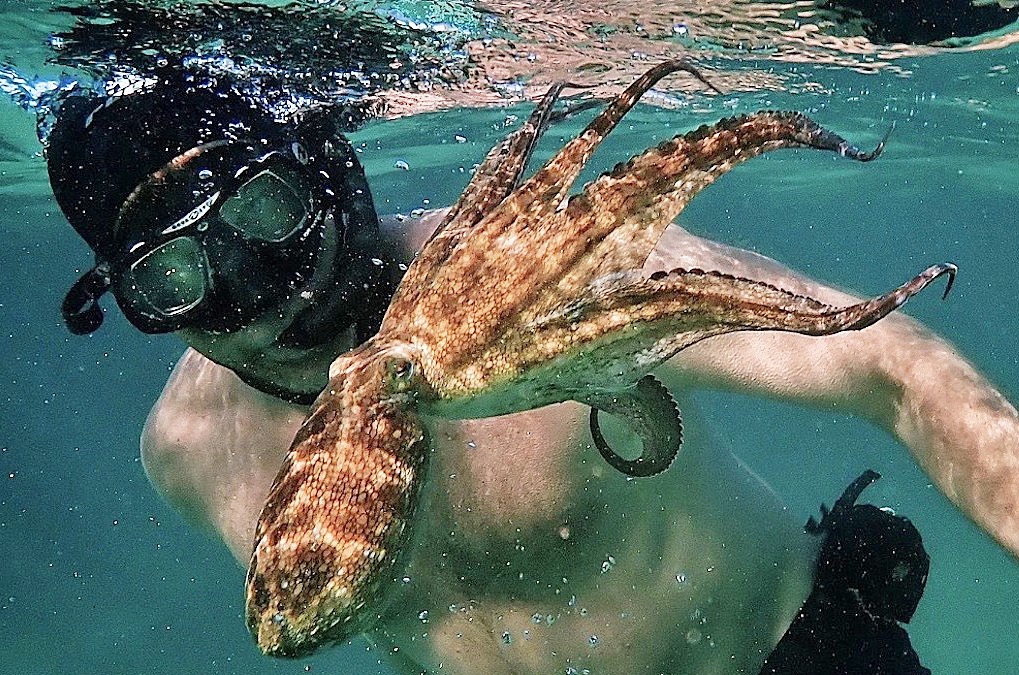
No, The Guy Does Not F*** The Octopus: What You Need To Know About The Netflix Documentary 'My Octopus Teacher'
This week, I was scrolling through Twitter, generally minding my own business (insofar as that's possible while scrolling Twitter), when I came across this tweet and subsequent thread:
This was a lot of information to take in — accompanied by as much intrigue. A documentary about a diver and an octopus? A documentary about a diver and an octopus who had an erotic relationship?? A documentary about a diver and an octopus who had an erotic relationship that was ultimately a tearjerker??? I had to learn more.
The person who tweeted this, Sophie Lewis (@reproutopia), posted her thoughts about the documentary after watching it, relating it to various literature and studies about octopuses and also to queer theory.
However, there were as many curious reactions as horrified ones to Lewis's thread, and each type spurred new indignant reactions, which is what sent this conversation from Octopus Documentary Twitter, if you can call it that, into so many people's timelines.
At the time I read this thread, it was my only exposure to the documentary. Despite the fact that a lot of Lewis's references went over my head, it made me extremely curious to watch. And it seems to have done the same for a lot of people, given how many tweets there have been about the documentary since.
But it shouldn't be too great a surprise that, by and large, following Lewis's thread, most people still had one burning question:
To cut to the chase: the answer is no. Even before Lewis tweeted about the film, writer and beloved Twitter personality Nicole Cliffe (@Nicole_Cliffe) shared her thoughts:
So it seems like rumors of octopus sex had been floating around from the jump. But because we're diligent fact-checkers here at Digg, and because we were curious about the documentary, I committed to watching it.
The documentary is about a man, Craig Foster, who begins diving in an underwater kelp forest in South Africa and discovers an octopus. He visits her and spends time with her until she finally trusts him, and they form a strange, unprecedented sort of bond.
Even primed as I was to look for the erotic in this documentary, all I ended up feeling was awestruck and moved. There is a lot of physical contact between Foster and the octopus, yes — but it's nothing more nor less than magical and heartwarming. The octopus behaves in remarkably recognizable ways: she stretches out a tentacle to touch Foster the way a human would stretch out her hand; when Foster makes a sudden movement she gets skittish and swims away, until she can determine that everything is okay. Fifteen minutes into the documentary, I was ready to die for this octopus, and Foster is an excellent narrator and a gentle soul.
The reviews for "My Octopus Teacher" are in the same vein: USA Today's review is headlined "Is There Something In Your Eye, Or Did You Just Watch Netflix's 'My Octopus Teacher'?" From EcoWatch: "'My Octopus Teacher' Stuns Audiences, Reinforces Power Of Nature." From The Cut: "The Love Story We All Need Right Now."
But, of course, a movie about such a tender, unusual relationship in which one party does not communicate in a language we fully understand will invite — as it should! — a lot of interpretation. Sophie Lewis watched the documentary through the lens of queer theory. Though I don't think I would have thought about eroticism if I'd watched the doc before reading Lewis's tweets, the erotic-octopus discourse made me think about how many different kinds of touch there are, and how Foster's unique connection with this animal is a kind of relationship different from any two humans'.
Anyway, it's refreshing how differently people can interpret something like this. And if no octopodes were actually harmed in the making of this film, who is it hurting to interpret it as erotic?
So though we can now assuage any fears of and/or hopes for octopus sex, you've been warned: this movie will take your heart and squeeze it into mush. And you will very likely cry.